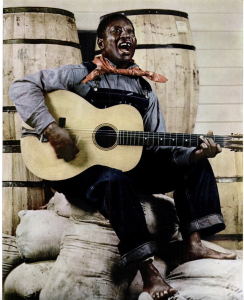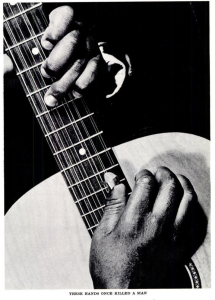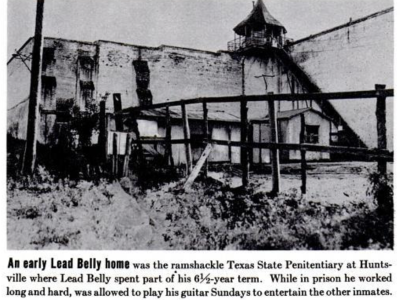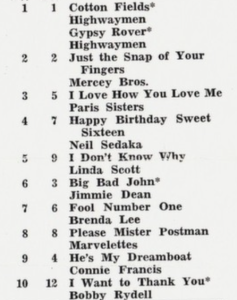#1: Cotton Fields by the Highwaymen
City: Halifax, NS
Radio Station: CHNS
Peak Month: November 1961
Peak Position in Halifax ~ #1
Peak position in Vancouver ~ #6
Peak Position on Billboard Hot 100 ~ #13
YouTube: “Cotton Fields”
Lyrics: “Cotton Fields”
Dave Louis Fisher was born in New Haven, Connecticut, in 1940. In high school, Fisher had been part of a doo-wop group named The Academics. In 1958, Fisher helped form The Clansmen as a collegiate folk quintet of four freshmen at Weslayan University in Middletown, Connecticut. According to Joseph Murrells in his book, The Book of Golden Discs, Dave Fisher was the quintet’s lead singer and arranger. The other original members of the group were tenor Bob Burnett (born in Providence, RI), bass Steve Butts (born in New York City), baritone Chan Daniels (born in Argentina) and guitarist Steve Trott (born in Glen Ridge, NJ). The name, The Clansmen, they reasoned, was suggestive of Irish and Scottish clans, reflecting the Celtic roots of the songs the folk group performed. However, in the Civil Rights era with growing awareness of the violent acts and images of the Ku Klux Klan (known as the Klansmen), The Clansmen was not going to be a wise choice for the folk group to bill themselves if they wanted to go far. When they signed with United Artists at the end of 1959, they were given a new name, The Highwaymen. The name was inspired by the lines from lines by British poet, Alfred Noyes, “A highwayman comes riding…riding…riding,” from his 1906 poem The Highwayman.
Steve Butts remembers that by their third year in college, in 1960, The Highwaymen were making pocket money as a folk group. “In our junior year, we used to get in the car to play more and more around New England. We’d make a couple of hundred bucks and make just enough to pay for gas and the motel. We mostly played alone, but one time we played with a duo called The Simon Sisters. That was Carly Simon and her younger sister. We certainly heard her name. They were just starting out the way we were. They were a duo at that time, but basically we just played colleges, and dances, and things like that… for not many bucks.”
In 1960 The Highwaymen recorded a song originating in Saint Helena Island, one of South Carolina titled “Michael Row The Boat Ashore.” The song had been heard by abolitionist Charles Pickard Ware in 1862 who wrote down the lyrics of the song sung by plantation workers on the island who were now freedmen. Years later the song was taught to folk singer, Pete Seeger, in 1954. The Weavers sang “Michael Row the Boat Ashore” at their reunion concert in 1955. In 1960, The Highwaymen recorded “Michael.” It broke onto the pop charts in Worcester, Massachusetts, in March 1961, and in Springfield (MA) in April 1961. By September 1961, The Highwaymen had a number one record for two weeks with “Michael”/ It ended up becoming the #3 hit for the year 1961 on the Billboard year-end singles chart.
The Highwaymen were part of a folk music revival in America that had been chugging along since The Weavers had a number one hit in 1950 with “Goodnight Irene.” Other successful folk music artists in the late 1950’s and early 1960’s included the Kingston Trio and the Brothers Four. The follow up single to “Michael” for the Highwaymen was “The Gypsy Rover”.
The Highwaymen next released a single titled “Cotton Fields”.

“Cotton Fields” was written by Huddie Ledbetter, who recorded the song in 1940, credited to him stage name Leadbelly.
In the 1950s, “Cotton Fields” was recorded by Odetta and Harry Belafonte. It was covered as an album track in the 60s by The Seekers, New Christy Minstrels, Ferlin Husky, The Springfields, Johnny Cash, Ace Cannon, The Angels, Elvis Presley, Petula Clark, Elton John, The Pogues, Teresa Brewer (on The Muppet Show), and Unit 4 +2.
“Cotton Fields” is a song that geographically takes place in a cotton field in Louisiana, “just about a mile from Texarkana.” The lyrics are in the geographical ballpark – though the southeastern outskirts of Texarkana, Arkansas, is not “a mile” from Louisiana, but about 16 miles from the northwestern Louisiana border and the towns of Ida and Zylks (LA). The singer recalls being rocked in a cradle by their mama in a cotton field.
Leadbelly correctly observed, “when them cotton balls get rotten, you can’t pick very much cotton.” Wikifarmer reports “Cotton is a plant that needs a long frost-free period, a lot of heat and plenty of sunshine. It prefers warm and humid climate. Cotton seeds will have a small germination rate, if the soil temperature is below 60°F (15°C). During active growth, the ideal air temperature is 70 to 100°F (21-37°C). Temperatures well above 100°F are not desirable. However, the average cotton plant can survive in temperatures up to 110°F (43°C) for short periods without great damage, but this also depends on the humidity levels. In order to cultivate cotton plants successfully, we shall not have frequent rainfalls during the maturing (summer) and during the days of harvest (during autumn).”
Huddie William Ledbetter was born in 1888 in Mooringsport, Louisiana, just outside Shreveport. The 1900 U.S. Census lists him as 12 years of age. This is consistent with the 1910 and 1930 census records, though there have been some who suggest he was born in 1889, as shown in his 1942 draft registration card. He first learned to play the accordion when he was a child. By 1903 he was a street musician. He performed to Shreveport audiences in St. Paul’s Bottoms, a notorious red-light district. He began to develop his own style of music after exposure to the various musical influences on Shreveport’s Fannin Street, a row of saloons, brothels, and dance halls in the Bottoms. This area is now referred to as Ledbetter Heights. Between 1915 and 1939, Ledbetter served several prison and jail terms in Louisiana for a variety of criminal charges. In 1918, under the name of Walter Boyd, he was convicted of murder in Texas and sentenced to 30 years in prison. After writing a song pleading for clemency Ledbetter was pardoned in 1925.
Folklorists John and Alan Lomax recorded Leadbelly starting in 1933. His nickname, Leadbelly, is likely due to a mishearing of his surname – Ledbetter – by others due to Leadbelly’s strong accent. Others suggest is was because fellow prisoners thought Leadbelly was physically tough. Blues singer Big Bill Broonzy thought it came from a supposed tendency to lie about as if “with a stomach weighted down by lead” in the shade when the chain gang was supposed to be working.
Leadbelly mostly played a 12-string-guitar, and developed a picking style based on barrelhouse piano and Mexican Bajo Sexto guitar playing, both popular in Louisiana. He wrote and/or adapted songs that have become classics in the folk-blues tradition. These include “Goodnight Irene”, “Midnight Special”, “Boll Weevil”, “I Got Stripes”, “In The Pines”, and “Take This Hammer”.
On April 19, 1937, Life magazine ran a three-page article titled “Lead Belly: Bad Nigger Makes Good Minstrel.” It included a full-page, color (rare in those days) picture of him sitting on grain sacks playing his guitar and singing.

Also included was a striking photograph of his wife Martha Promise (identified in the article as his manager). Other photos showed Lead Belly’s hands playing the guitar (with the caption “these hands once killed a man”).

Life caption reads: “These hands killed a man”
Leadbelly was sentenced again in 1930 for stabbing a man in Louisiana, and for the last time in 1939 for stabbing a man in New York City.

Life article showed several photos exploring Leadbelly’s past. In 1949, Leadbelly flew to France and performed in concert. But he was unable to complete his tour as he fell ill to a motor neuron disease, possibly Lou Gehrig’s disease. He died in 1949 at the age of 61. Since his death, Leadbelly has been inducted into the Blues Hall of Fame (1986), the Rock and Roll Hall of Fame (1988), and the Louisiana Music Hall of Fame (2008).
“Cotton Fields” peaked at #1 in Halifax (NS), Winnipeg (MB), Atlanta, Pensacola (FL), and Fargo (ND), #2 in Lakeland (FL), Montreal, Washington DC, and Tulsa (OK), #3 in Toronto, Lansing (MI), Nashville, York (PA), Worcester (MA), Chicago, Pueblo, (CO), and Newport News (VA), #4 in Ottawa, Dayton (OH), Los Angeles, La Crosse (WI), Denver, Yuma (AZ), and Calgary, #5 in Houston, Columbus (OH), Birmingham (AL), Charleston (WV), Hartford (CT), Cleveland, and Spokane (WA), #6 in Vancouver (BC), Davenport (IA), Seattle, Minneapolis/St. Paul, and Akron (OH), #7 in Manchester (NH), Shreveport (LA), #8 in Louisville (KY), and Baltimore (MD), #9 in Toledo (OH), Springfield (MA), #10 in Buffalo, Boston, and Omaha (NE), and #11 in New York City.
In 1970, the Beach Boys had a number-one hit with “Cotton Fields” in Australia and Norway, and a Top 5 hit in Denmark, Ireland, Rhodesia, South Africa, Sweden and the UK. While Creedence Clearwater Revival covered “Cotton Fields” and their version shot to #1 in Mexico in 1970.
In Halifax, “Cotton Fields” knocked “Big Bad John” by Jimmy Dean out of the top spot.
At the time they had several appearances on the Ed Sullivan Show and the Tonight Show with Jack Paar. The Highwaymen also had a Top 30 single in the spring of 1962 in Vancouver titled “Whiskey In A Jar.” In 1963, The Highwaymen were an opening act at The Hungry i nightclub in San Francisco for comedian Woody Allen. They also appeared on Hullabaloo.
The Highwaymen disbanded in 1964. Dave Fisher went to work in Hollywood in 1967. He became a composer and arranger and wrote hundreds of tracks for TV and film. Bob Burnett served in the United States Army Reserve and then got a career in law and banking. Chan Daniels went on in the A&R departments for MGM and Capitol Records. He left employment to start his own successful international music company. However, Daniels died unexpectedly of pneumonia in 1975. Steve Butts got a Ph. D. in Chinese Politics and taught baroque music. In 1987, the Highwaymen had a 25-year college reunion concert.
In 1990, Dave Fisher was at a concert in Houston where a new group who named themselves the Highwaymen were performing. In this case, The Highwaymen were a country music supergroup comprised of Willie Nelson, Waylon Jennings, Johnny Cash and Kris Kristofferson. Dave Fisher was uncomfortable with the “Highwaymen” memorabilia for sale at the concert. It happened that one of the early 60’s folk band members of The Highwaymen, Steve Trott, had become a Department of Justice official in the Reagan administration. Furthermore, Trott had been promoted to the position of judge on the United States Court of Appeals for the Ninth Circuit. With Steve Trott’s counsel, the new Highwaymen were sued for copyright infringement by the original Highwaymen. Waylon Jennings proposed a resolution of the matter. Jennings suggested to the original Highwaymen that they open an upcoming concert for the country superstars in Los Angeles. The original Highwaymen accepted the offer.
The Highwaymen performed their final concert in 2009. Dave Fisher died in 2010 and Bob Burnett passed in 2011.
April 29, 2024
Ray McGinnis
References:
Robert von Bernewitz, “The Highwaymen – An interview with Dr. Steve Butts. They had a Billboard #1 hit with “Michael, Row The Boat Ashore” in 1961,” Music Guy 247.com, June 14, 2014
Stephen S. Trott bio, Wikipedia.org
Dennis Hevesi, “Bob Burnett, 71, Performer in the Original Highwaymen, Dies,” New York Times, December 10, 2011
Douglas Martin, “Dave Fisher, Member of the Highwaymen, Dies at 69,” New York Times, May 12, 2010
Derek Schofield, “Dave Fisher Obituary: Singer and arranger with the US folk group the Highwaymen,” Guardian, June 8, 2010
Murrells, Joseph. The Book of Golden Discs. Barrie & Jenkins, 1978.
Michael Jack Kirby, The Highwaymen, Wayback Attack.com.
“Cotton Growing Conditions,” Wikifarmer.com.
Beach Boys, “Cotton Fields“, Capitol Records, 1970.
Creedence Clearwater Revival, “Cotton Fields“, 1970.
“Leadbelly: The Man Who Rocked the World of Music,” OurMusicWorld.com, September 15, 2023.
“Lead Belly: Bad Nigger Makes Good Minstrel,” Life, April 19, 1937.
Christine Hamm, “Ledbetter Huddie [Lead Belly] (1888-1949),” Texas State Historical Association, November 22, 2022.

CHNS 960-AM Halifax (NS) Top Ten | December 3, 1961

Leave a Reply